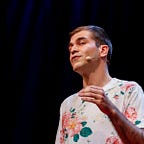Our world is interconnected, but our socioeconomic principles are not.
As we’ve globalized, inclusive fitness has shifted from kin tribes to nuclear families.
Self-dealing has exacerbated as there are no mutual skin in the game incentives.
We need to rewrite our social contract for inclusive stakeholding, especially as we enter the exponential technology age.
~50% of all new wealth that’s generated goes to the top 1%.
Median male income in the USA has flatlined since 1970 meanwhile GDP has skyrocketed.
Existing social contracts benefit investors and shareholders, but not communities, the environment, the customers, and the gig workers that help build the wealth.
These old codes are creating instability in our world, and since 2008, we’ve been given incredible technology to help us write the new codes.
A couple solutions we propose:
1) Smart contracts that pay out appreciating tokens on the blockchain.
Each person/company/government is allocated a given amount of tokens which get distributed over their lifespan as financial rewards to key players along their journey.
Each person/company/government also earns tokens from key players they build relationships with along their journey, creating vested stakeholding.
A. Education
Teachers, Mentors, Online Curricula, etc. enter into dynamic smart contracts with Students which adjust based on variables we are still identifying, some of which include the relationship’s efficacy, content exchange, time period, and more. Given a higher smart contract score, the tokens paid out will be greater, and vice-versa. This creates vested interest in the Student’s life outcome.
B. Healthcare
Physicians, Spiritual Sages, Nutritionists, Coaches, etc. also enter into dynamic smart contracts with Patients which adjust based on variables we are still identifying, some of which include the Patient’s day to day biometrics measurements, the content exchanged, measuring the relationship’s efficacy, time period, and more. Given a higher smart contract score, the tokens paid out will be greater, and vice-versa. This creates vested interest in the Patient’s health & wellbeing.
C. Companies
Public and private companies also enter into dynamic smart contracts with the cities they have offices in, the global environment at large, their customer base, gig workers, etc. which adjust based on variables we are still identifying, some of which include the size of the company in terms of revenue, employees, impact on their cities and our environment, how much the customer base & gig workers are contributing to the wealth creation, and more. Given a higher smart contract score, the tokens paid out will be greater, and vice-versa. This creates vested interest between the company, cities, environment, customers, and gig workers.
D. Governments
Federal & State Governments also enter into dynamic smart contracts with their citizens which adjust based on variables we are still identifying, some of which include their efficacy with taxation and growth, voting recording alignment of elected officials with their constituency, environmental stewardship, wellbeing of its citizens, the relationship’s time period, and more. Given a higher smart contract score, the tokens paid out will be greater, and vice-versa. This creates vested interest between Governments and their citizens.
This is especially crucial to ensure the distribution of fruits of emerging markets such as AI & robotics, bio/neurotech, quantum computing, blockchain & cryptocurrency, psychedelics, cannabis & hemp, and more so that people live in dignity, peace, love, and harmony, with inclusive ownership of the future we are all building.
2) Projects in the Humanities that awaken people to our interconnectedness and inspire them to write these new codes for inclusive stakeholding of the future will earn tokens from companies (including philanthropies), governments, and individual donors. Example multimedia content includes Songs, Movies, TV Series, Online Videos, Books, Articles, and more.
3) Formation of new Dunbar communities which practice kin tribe principles similar to what Indigenous Communities have been practicing for millennia like currently happening in Colorado, New Mexico, Bali, Costa Rica, Puerto Rico, and more. Observing the evolution of these communities, their interconnected principles and practices, and building future communities with the best combined protocols.
4) Formation of Sub-Prizes which tackle specific aspects to the challenges written above, examples include crowdsourcing solutions to the tokenomics or the smart contracts or how to compute the vested interest of the multiple variables over time and its distribution, other Sub-Prizes for successful community developments or projects in the humanities.
This project will begin with vested stakeholding ledgers between thousands of teachers & students and physicians & patients, dozens of companies & their cities, customers, gig workers, our environment, and an experimental government or two, analyzing the progress over time, conducting A/B testing to optimize weighing of the vesting variables, token payout schedules, and economic determinants of token values, then adding more use cases.
Our team will consist of engineers, financiers, tokenomists, accountants, designers, entrepreneurs, and operators, working in collaboration with the Incentive Prize on Incentives team and mentor network. If selected as a winner on December 1st, 2019, we will deploy our first solution by May 1st, 2020.
Thank you for your consideration and foresight as leaders of building the next world.
Allen & Team
This proposal was submitted for the Incentive Prize on Incentives which had a 5,000 character (800 word) limit.
http://www.incentiveprizeonincentives.org
